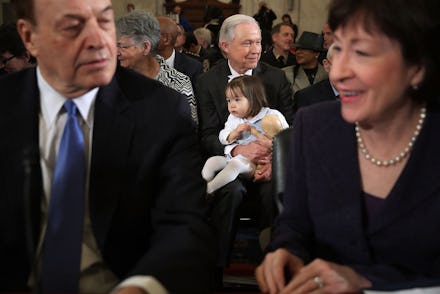Ira Madison III's Jeff Sessions tweets were politically incorrect. But the right didn't defend him.

A minor controversy broke out online Tuesday during Sen. Jeff Sessions' confirmation hearing to become U.S. attorney general.
During opening statements, Sessions was photographed in the Senate chamber playing with his Asian-American granddaughter — the child of Sessions' daughter, Ruth Sessions Walk, and her husband, John Walk, who is Asian-American.
The incident seemed incongruous with Sessions' public image. Progressives have objected to the Alabama senator's nomination to run the Justice Department, claiming he is racist, the evidence for which derailed his nomination for a federal judgeship in 1986.
The move was cynical and calculated, some critics alleged. When the footage aired, MTV News writer Ira Madison III posted a series of since-deleted tweets suggesing the senator was using his nonwhite granddaughter as a "prop" to make him appear less racist.
The backlash to Madison's tweets was swift and harsh. Conservatives and even some progressives called him an "asshole" and a "smug controversialist."
CNN anchor Jake Tapper questioned Madison's humanity.
Actor and outspoken conservative James Woods called on his "500,000 followers" to help get Madison fired.
The hand-wringing culminated in multiple news outlets covering the incident — including Mic — and MTV News issuing a public apology for its writer's behavior.
Madison's tweets were certainly impolitic. But the conservatives criticizing him, including writers at Breitbart and the Washington Times, seemed unconcerned with whether the underlying charge — that Sessions was using his granddaughter to distract from his checkered history on racial issues — is true.
We can't know Jeff Sessions' motivations on Tuesday for certain. Sitting his granddaughter on his lap while the cameras flashed away may well have been an innocent gesture. But considering what we know about him — that he's been accused multiple times of racist conduct; that he's undergoing a high-profile Senate confirmation hearing for the most powerful law-enforcement job in the United States; and that he's already shown a tendency to distort his own civil rights record to cast himself as less racist — it seems odd to give him the benefit of the doubt. How often do racists try deflecting accusations of racism by invoking their "black friends" or nonwhite family members?
This contradiction exposes one of the biggest hypocrises in the right's outcry over political correctness: the notion that liberals prioritize politeness over telling uncomfortable truths.
Conservative pundits have long argued political correctness is ruining America. It "stifles freedom of speech," overrides "common sense" and, in worst-case scenarios, even "kills Americans," they claim. It privileges a fear of offending over keeping the rest of us safe. By failing to label Islam as a threat, for example, liberals are exposing us to terrorist attacks.
The outcry has been so galvanizing of late that President-elect Donald Trump rose to power by branding himself the anti-political-correctness candidate. The top quality voters in the South Carolina GOP primary expressed about him was that he "tells it like it is."
Yet while conservatives relish in flouting political correctness, they're rarely speaking unspoken truths; usually, they're not speaking the truth at all. To freely declare Americans should admit undocumented immigrants bring crime and economic ruin to the United States, for instance, does not make you a bold truth-teller. It's dodging the facts — that undocumented immigrants commit fewer crimes than native-born Americans while also contributing significantly to the U.S. economy — in order to justify xenophobia.
But the greater irony is many conservatives are remarkably sensitive whenever someone speaks an uncomfortable truth about them. They recoil in indignation when someone shirks politeness and calls them out for their bigotry. In August, Maine's Republican Gov. Paul LePage — a vocal critic of political correctness — said being called "racist" was "like calling a black man the 'N' word or a woman the 'C' word." Republican committee members dedicated a significant portion of Tuesday's hearing to letting Sessions complain about how bad it made him feel to be labeled a racist.
It's an uncharitable accusation toward the Alabama senator, but it's less deplorable than Sessions would be if he did, indeed, use a family member — a child — as part of some public-relations stunt. That the conservatives lambasting Madison declined to address the substance of his accusation shows just how selective their outrage is.